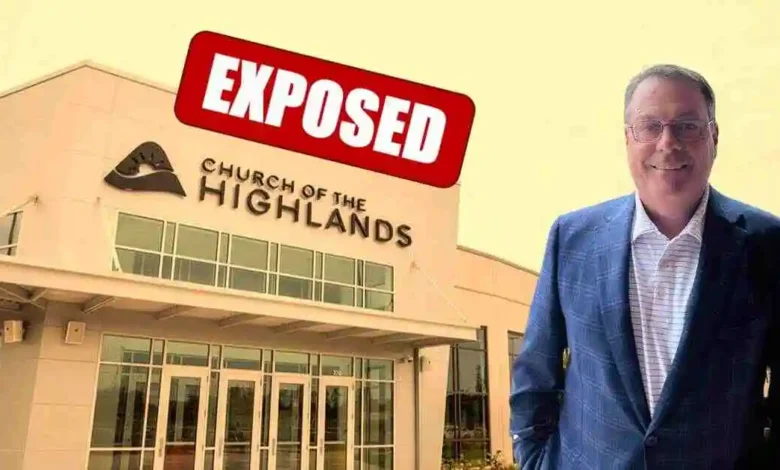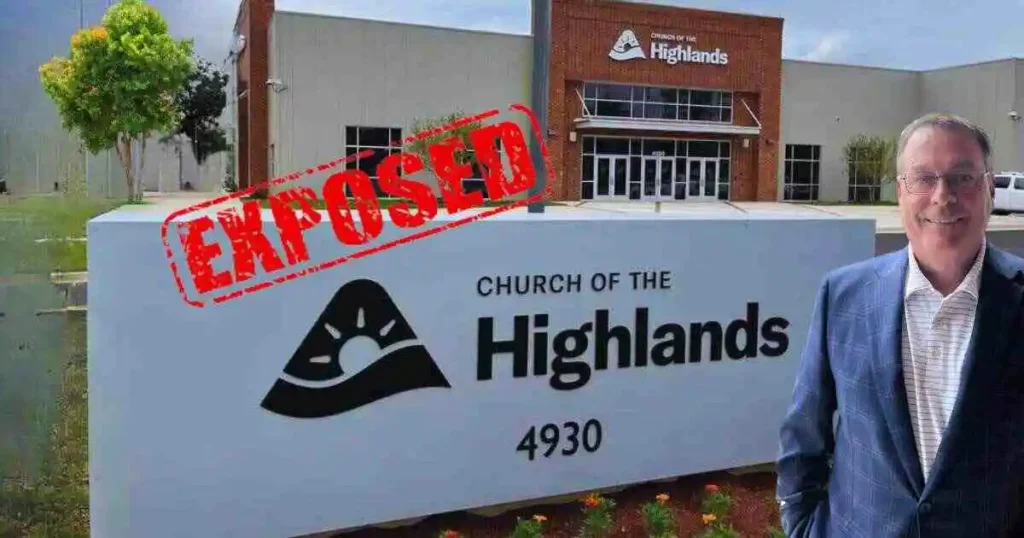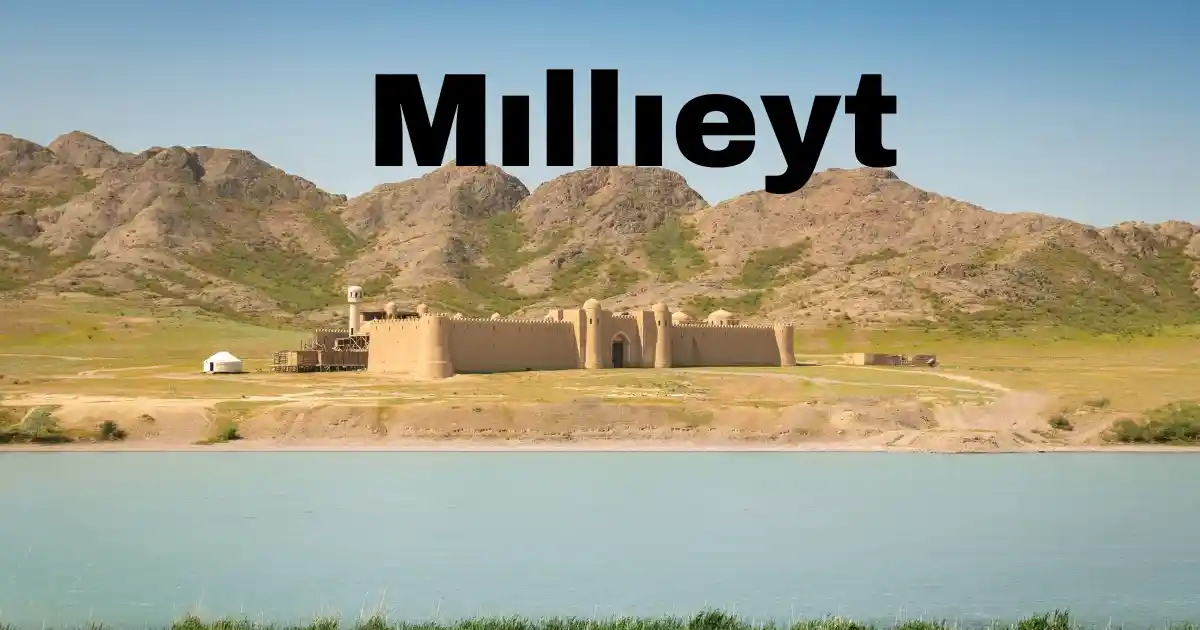Church of the Highlands Exposed: Unveiling the Truth

The church of the highlands exposed, often referred to as COTH, is a major megachurch located in Alabama. Founded by Chris Hodges in 2001, the church has grown rapidly to become one of the largest and most influential churches in the state. With over 20 campuses and thousands of members, the Church of the Highlands has a significant presence in the community. However, recent controversies have put this prominent church under intense scrutiny, raising questions about its financial practices, leadership, and cultural sensitivity.
Church of the Highlands Exposed – History

The Church of the Highlands was founded on February 4, 2001, by Chris Hodges and a small group of 34 people. In 2007, they opened their main building, which could seat 2,400 people. Since then, the church has grown and established many campuses in the Birmingham area.
In the “Outreach 100” ranking for 2022, the Church of the Highlands was ranked second, with over 60,000 people attending weekly. They had previously held the first position in 2018. As of February 5, 2022, the church had 25 campuses in Alabama and Georgia. The newest campus, the Woodlawn Campus near Birmingham Shuttlesworth International Airport, started welcoming visitors on September 11, 2022.
In 2023, they unveiled “The Lodge at Grants Mill” on their main campus in Irondale, Alabama. This lodge was created as a place for pastors to find rest, as Chris Hodges wanted pastors to feel refreshed and focused on their calling, especially during times of high burnout rates among pastors.
According to a church census in 2023, the Church of the Highlands had a weekly attendance of 60,000 people.
The Rapid Growth and Influence of the Church of the Highlands
The Church of the Highlands has expanded at an astonishing pace since its inception. From its humble beginnings in a high school auditorium, it has grown to multiple campuses across Alabama, attracting a large and diverse congregation. This rapid expansion has made COTH a powerful force in the local community, with extensive outreach programs and a strong emphasis on community service. Under the dynamic leadership of Chris Hodges, the church has not only grown in size but also in influence, shaping local culture and politics in significant ways. However, this rapid growth has also brought scrutiny and criticism, particularly concerning how the church manages its vast resources and engages with its followers.
Core Beliefs and Practices of the Church of the Highlands
Understanding the Church’s Doctrines
The Church of the Highlands follows evangelical Christian beliefs. They emphasize the importance of the Bible and salvation through Jesus Christ. Their teachings focus on personal growth and community service.
Unique Church Culture and Programs
The church offers various programs for different age groups. They have youth groups, small group ministries, and outreach initiatives. Their culture promotes active participation in church life. Many members find a sense of belonging and purpose.
The Controversies
In March 2020, controversy erupted when Pastor Chris Hodges supported former pastor John Gray after he was accused of cheating on his wife. Hodges publicly defended Gray, stating that he believed in him and his marriage. This sparked backlash from many who felt that Hodges was enabling infidelity within the church.
Additionally, the Church of the Highlands has faced criticism for its lack of diversity and inclusivity. In 2018, the church was met with backlash after it donated $25,000 to a political campaign opposing same-sex marriage. This caused members of the LGBTQ+ community to feel unwelcome in the church.
Allegations of Misuse of Funds
In August 2020, former employees of the Church of the Highlands came forward with allegations that tithes and offerings were being used for purposes other than ministry work. They claimed that Pastor Chris Hodges and his family were receiving lavish salaries and benefits, while church staff were not adequately compensated.
Furthermore, there have been accusations of nepotism within the church, with members of Pastor Hodges’ family holding prominent positions and receiving high salaries. These allegations have caused concern among church members who want their donations to be used for the betterment of the community.
Financial Transparency and Mismanagement Concerns
Financial transparency has been a significant issue for the Church of the Highlands. Critics have raised concerns about how the church handles its finances, particularly the vast sums of money it collects in donations. There have been allegations of financial mismanagement and questions about whether the church is sufficiently transparent with its members and the public. Comparisons with other megachurches highlight similar challenges, where large financial operations often lead to scrutiny and demands for greater accountability. The Church of the Highlands has responded to these allegations with some public disclosures and assurances, but many still call for more detailed and accessible financial reporting.
Leadership and Governance Issues
Leadership and governance at the Church of the Highlands have also come under fire. Accusations against church leaders, including Chris Hodges, have surfaced, ranging from misconduct to ethical concerns. The governance structure of the church is often questioned, with critics arguing that there needs to be more accountability and oversight. This lack of transparency can lead to misunderstandings and mistrust among the congregation and the broader public. In response to these issues, the church has made efforts to implement new policies and improve governance practices, aiming to rebuild trust and ensure more robust accountability mechanisms.
Church of the Highlands Exposed Controversy
The Church of the Highlands, a prominent megachurch in Alabama, has recently come under intense scrutiny due to several controversies. These include allegations of financial mismanagement, ethical lapses in leadership, and questionable involvement in social and political issues. Additionally, concerns about cultural and racial sensitivity within the church have sparked significant public debate. Critics argue that the church’s rapid growth and influential presence may have overshadowed the need for transparency and accountability. In response, the Church of the Highlands has attempted to address these issues through policy changes and public reassurances, but the controversies have left lasting questions about its practices and governance.
Social and Political Involvement
Church’s Stance on Social Issues
The Church of the Highlands has clear positions on various social issues. These include topics like marriage, family, and morality. Their stances often reflect traditional evangelical views. This has sparked both support and opposition from the public.
Influence in Local and National Politics
The church is active in political discussions at both local and national levels. They support candidates and causes aligned with their values. This political involvement has raised eyebrows. Some believe it blurs the line between religion and politics.
Criticisms of Political Endorsements
Political endorsements by the church have been controversial. Critics argue that it alienates members with different views. They believe the church should remain neutral. This debate highlights the challenges of mixing religion and politics.
Cultural and Racial Sensitivity
Cultural and racial sensitivity is a critical issue for the Church of the Highlands. There have been several reports of racial insensitivity and discrimination within the church. These incidents have sparked public outcry and led to calls for greater inclusivity and diversity. The church has responded to these concerns by issuing public apologies and making efforts to promote a more inclusive environment. However, some believe that these actions are not enough and that more substantial changes are needed to address these deep-rooted issues. Promoting racial and cultural sensitivity is essential for the church to maintain its community’s trust and support.
Official Response and Reactions
Church’s Official Statements
The Church of the Highlands has responded to criticisms with official statements. They have addressed various issues publicly. These responses aim to clarify their positions and actions. They show a willingness to engage with their critics.
Actions Taken by the Church Leadership
In addition to statements, the church has taken concrete actions. They have implemented new policies and initiatives. These efforts are meant to address concerns and improve the church. It demonstrates their commitment to positive change.
Impact on Membership and Community Trust
The controversies have affected the church’s membership and community trust. Some members have left, while others remain supportive. The church’s response will play a crucial role in rebuilding trust and unity.
Broader Implications for Megachurches
The controversies surrounding the Church of the Highlands reflect broader issues faced by many megachurches. Large religious organizations often grapple with financial transparency, leadership accountability, and the balance between social involvement and political engagement. These challenges highlight the need for reforms in how megachurches operate, emphasizing the importance of clear governance practices and ethical leadership. The situation at the Church of the Highlands serves as a case study for other religious organizations, offering valuable lessons on the importance of transparency, accountability, and cultural sensitivity in maintaining public trust and support.
Personal Accounts and Testimonials
Personal experiences from members and former members of the Church of the Highlands provide valuable insights into the church’s culture and practices. Some former members have shared positive memories of their time at the church, highlighting the sense of community and spiritual growth they experienced. Others, however, feel hurt or disillusioned, citing issues such as leadership misconduct or lack of transparency as reasons for leaving. Current members also have diverse perspectives, with many remaining supportive of the church and its leaders. These personal accounts underscore the complexity of the issues facing the Church of the Highlands and the varying impacts on its congregation.
READ MORE ABOUT COSMETIC SURGERY, LIPOSUCTION BEFORE AND AFTER
Timeline of Key Events
2001: Church of the Highlands is founded by Chris Hodges.
2005: The church expands with its first satellite campus.
2010: Allegations of financial mismanagement begin to surface.
2015: Reports of racial insensitivity cause public outcry.
2020: Church responds to controversies with new policies and public statements.
2023: Ongoing discussions about the church’s role in politics and community life.
What’s Next for the Church of the Highlands?
In response to the controversies and allegations, the Church of the Highlands has released statements defending their practices and denying any wrongdoing. Pastor Chris Hodges has also addressed these issues in sermons, urging members to trust in God and not be swayed by outside opinions.
However, it remains to be seen how these events will impact the future of the megachurch. The Church of the Highlands’ reputation has been tarnished, and it may take time for them to regain trust from both current and former members.
Conclusion
The Church of the Highlands has faced significant controversies involving financial practices, leadership issues, and cultural sensitivity. These challenges have led to public scrutiny and a mix of reactions from the community and its members. The church’s responses, including new policies and efforts to improve transparency and inclusivity, are steps toward addressing these issues. However, rebuilding trust will require ongoing commitment and action. The situation at the Church of the Highlands offers important lessons for other megachurches and religious organizations, highlighting the need for robust governance, ethical leadership, and a commitment to cultural sensitivity and inclusivity.
FAQ: Church of the Highlands
Q: What is the Highlands church scandal?
A: The Highlands church scandal refers to controversies involving Pastor Chris Hodges and the Church of the Highlands, notably in 2020, when Hodges liked racially insensitive social media posts. This led to public backlash and the Birmingham Board of Education severing ties with the church.
Q: What happened to Chris Hodges’ son?
A: David Hodges, Pastor Chris Hodges’ son, resigned from his pastoral role at Church of the Highlands in 2017 and later moved to Georgia, pursuing other personal and professional opportunities.
Q: Where is Pastor Chris Hodges now?
A: Pastor Chris Hodges continues to lead the Church of the Highlands as its senior pastor, despite past controversies.
Q: Is Church of the Highlands LGBTQ friendly?
A: The Church of the Highlands holds traditional Christian views on marriage and sexuality and does not affirm same-sex relationships, though they welcome all to attend services.
Q: What kind of religion is Church of the Highlands?
A: The Church of the Highlands is a non-denominational Evangelical Christian church, emphasizing personal faith in Jesus and the Bible’s authority.
Q: What does Church of the Highlands believe about baptism?
A: The church practices believer’s baptism by full immersion, for those who have chosen to follow Jesus, as a public declaration of faith.








